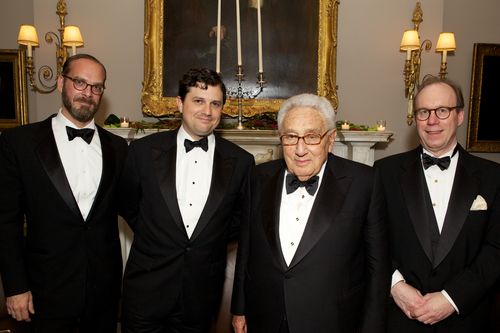Dr. Henry Kissinger at The New Criterion's inaugural Edmund Burke Award with editors David Yezzi, James Panero & Roger Kimball
THE WALL STREET JOURNAL
May 1, 2012
Kissinger Receives First Burke Award
by Gary Shapiro
Eighteenth-century statesman Edmund Burke looked favorably upon the American Revolution: If he were alive today, there's no reason to think he would not laud an American award in his honor, too.
Patrons and connoisseurs of culture assembled to celebrate the New Criterion, the New York-based monthly journal of arts and culture, which conferred upon Henry Kissinger its inaugural Edmund Burke Award. Last week's event marked the 30th anniversary of the publication.
Looking over the intimate gathering, it appeared as though the mastheads of prominent conservative publications had sprung to life and joined the party. Three editors at large, Myron Magnet of City Journal, John O'Sullivan of the National Review and Norman Podhoretz of Commentary magazine, rubbed shoulders with figures such as R. Emmett Tyrrell Jr., the editor in chief of the American Spectator. The think-tank world was represented by those such as Lawrence Mone, president of the Manhattan Institute. Roger Kimball, the editor and publisher of the New Criterion, rose to introduce the famous diplomat. He said Mr. Kissinger needed no introduction, but, nonetheless, found words to offer.
"I hear it often said that it's difficult to introduce me," said the former secretary of state. "But no one enjoys an introduction more than I do." The audience laughed when Mr. Kissinger began recounting self-deprecatingly how his late friend William Simon often said that Mr. Kissinger's knowledge of economics was a good argument for ending universal suffrage.
As roast rack of lamb with Provencal herb crust was being cleared, all ears were on Mr. Kissinger, who delivered a talk on "The Limits of Universalism: Conservatism and Neo-Conservatism in American Foreign Policy." Fittingly for the Burke Award, he spoke about the implications of what Burke's thoughts on English liberty had for fraternal arguments between contemporary conservatives and neoconservatives.
The questions and answers following his talk electrified the room. One asked, "Of the great British statesmen of the 19th century, who is the most able and least?" Mr. Kissinger said one far ahead of his time was Lord Castlereagh. Another asked, "Does the United States have a foreign policy or have we lost our way?"
Those who wished they had attended will not be disappointed to learn that Mr. Kissinger plans to publish the lecture. (Note: If you are Henry Kissinger, you can publish just about anywhere you like.)
As the evening closed, Mr. Kimball presented the Mr. Kissinger with a first edition of Burke's political writings. Mr. Kimball noted that the book contained "Thoughts on the Cause of the Present Discontents." The presenter emphasized how a tract about the abuse of power and what can be done about it remains uncannily pertinent today.
A group headed downstairs for a nightcap, where Mr. Kissinger, in his famous submarine voice, held court on a chair near the right side of room.
Missing was the New Criterion founding editor, Hilton Kramer, who will be remembered this month at a memorial.
Those leaving did not come away empty handed, either. Each received a signed copy of Mr. Kissinger's book, "On China" with a New Criterion bookplate that has a visage of Edmund Burke peering out.
